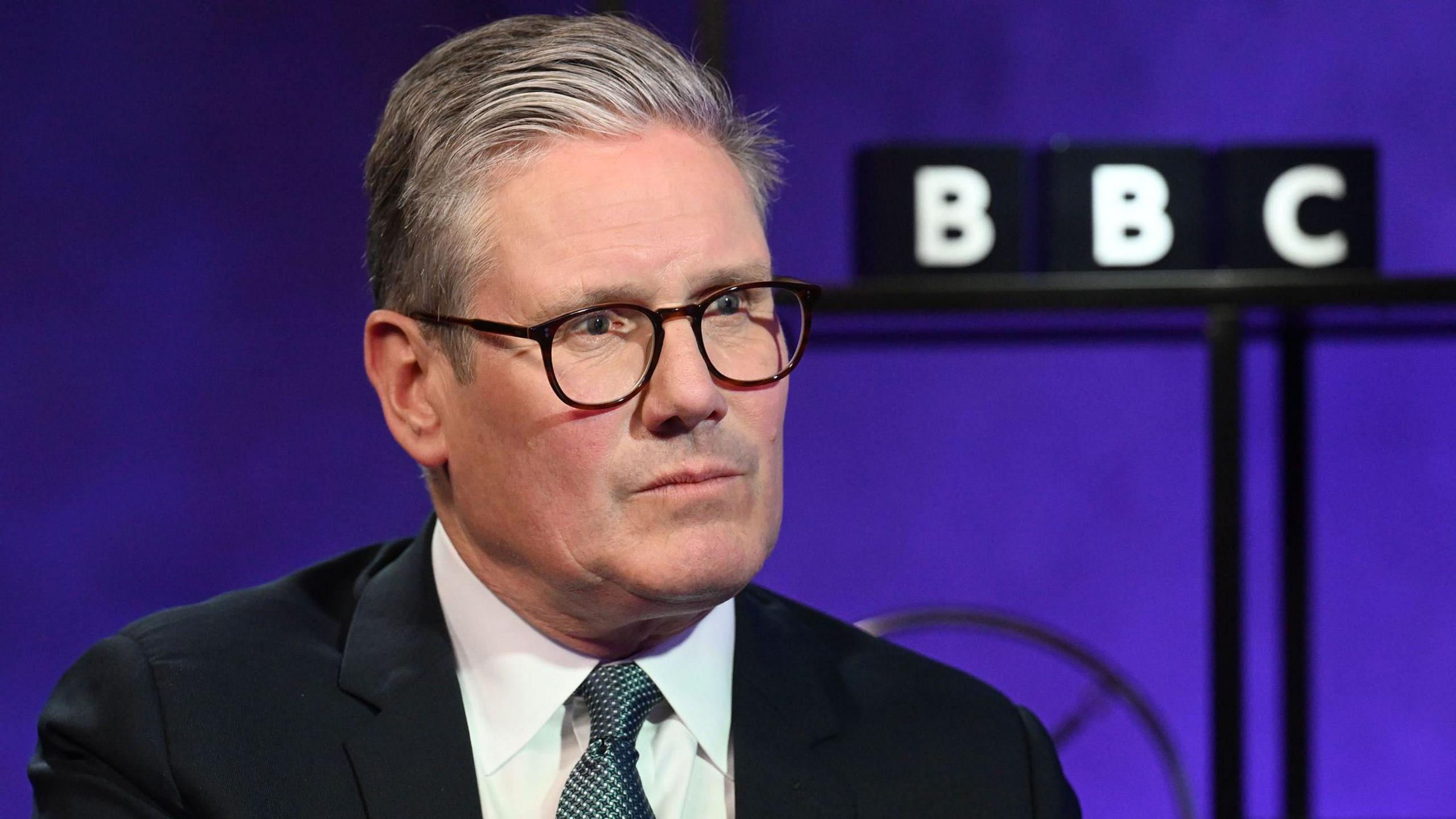PM says BBC must 'put house in order' over mistakes

Sir Keir Starmer said the "argument for impartial British news service is stronger than ever"
- Published
The prime minister has said the BBC must "get their house in order" when mistakes are made, but gave his support to the existence of "a strong and independent BBC".
Sir Keir Starmer was speaking after the broadcaster's director general and head of news resigned following criticism of an edit of a speech by Donald Trump and other editorial issues.
The prime minster did not directly respond to a question urging him to ensure the US president does not get "a single penny from British licence fee payers" after Trump's threat to sue the BBC for $1bn (£762m).
Sir Keir told the House of Commons: "Where mistakes are made, they do need to get their house in order, and the BBC must uphold the highest standards, be accountable and correct errors quickly. But I will always stand up for a strong, independent BBC."
He was responding to a question from Liberal Democrat leader Sir Ed Davey, who told Parliament that "President Trump is trying to destroy our BBC" and undermine press freedom in the UK as well as the US.
Sir Keir acknowledged that "some [people] would rather the BBC did not exist", but that "in an age of disinformation, the argument for impartial British news service is stronger than ever".
BBC director general Tim Davie and CEO of news Deborah Turness announced their resignations on Sunday and have admitted "mistakes".
BBC chairman Samir Shah has also apologised for the "error of judgement" that saw Panorama edit together two sections of Trump's speech on the day of the 6 January 2021 Capitol riots, giving the impression of a "direct call for violent action".
Trump says he has 'obligation' to sue BBC over speech edit
- Published1 day ago
In the Commons on Wednesday, Sir Ed also called for the prime minister to sack BBC board member Sir Robbie Gibb, a former BBC executive and Downing Street head of communications, who he branded a "Conservative crony".
In response, Sir Keir declined to comment on the "the individual runnings of the BBC".
In a separate debate on the BBC's leadership in the Commons on Tuesday, Culture Secretary Lisa Nandy said the process of setting out the corporation's next royal charter - which sets out the terms of its existence and due to expire in 2027 - would begin imminently.
"Together, we will ensure the BBC is sustainably funded, commands the public's trust and continues to drive growth, good jobs, skills and creativity across every region and nation of the UK," she said.
"In an era in which trust is fraying and truth is contested across our nation, it will ensure the BBC remains fiercely independent and is genuinely accountable to the public it serves."
Changes to key BBC committee
In response to an MP who asked her to "review the influence of former Conservative spin doctor Robbie Gibb on the BBC's board", Nandy replied that the BBC's charter "sets a strict legal threshold that must be met before dismissal of a board member, so I am unable to pursue the course of action that she suggests".
Nandy did say the BBC chairman had told her that he will make changes to the BBC's editorial guidance and standards committee, on which Sir Robbie sits.
"I understand that changes to that committee are planned, and I very much welcome that decision," she said.
Shadow culture secretary Nigel Huddleston called for a "root-and-branch review" of the corporation's adherence to impartiality, and for "a fulsome apology" to be given to the US president.
The BBC is considering how to respond to Trump after he set a deadline of Friday to receive an apology, a retraction and compensation for the Panorama edit.
On Tuesday, the president told Fox News he had an "obligation" to sue the BBC after it "butchered" his speech and "defrauded" viewers.
A spokesperson for the BBC said: "We are reviewing the letter and will respond directly in due course."
The controversy arose after an internal memo from a former independent external adviser to the broadcaster's editorial standards committee, Michael Prescott, was published by the Telegraph newspaper.
Mr Prescott's memo claimed BBC bosses had previously "refused to accept there had been a breach of standards and doubled down on its defence of Panorama".
It quoted BBC News deputy CEO Jonathan Munro as saying in May that there was "no attempt to mislead the audience about the content or nature of Mr Trump's speech" and that it was "normal practice to edit speeches into short form clips".
On Tuesday, when asked why he tried to defend the episode of Panorama, Mr Munro replied: "I didn't."